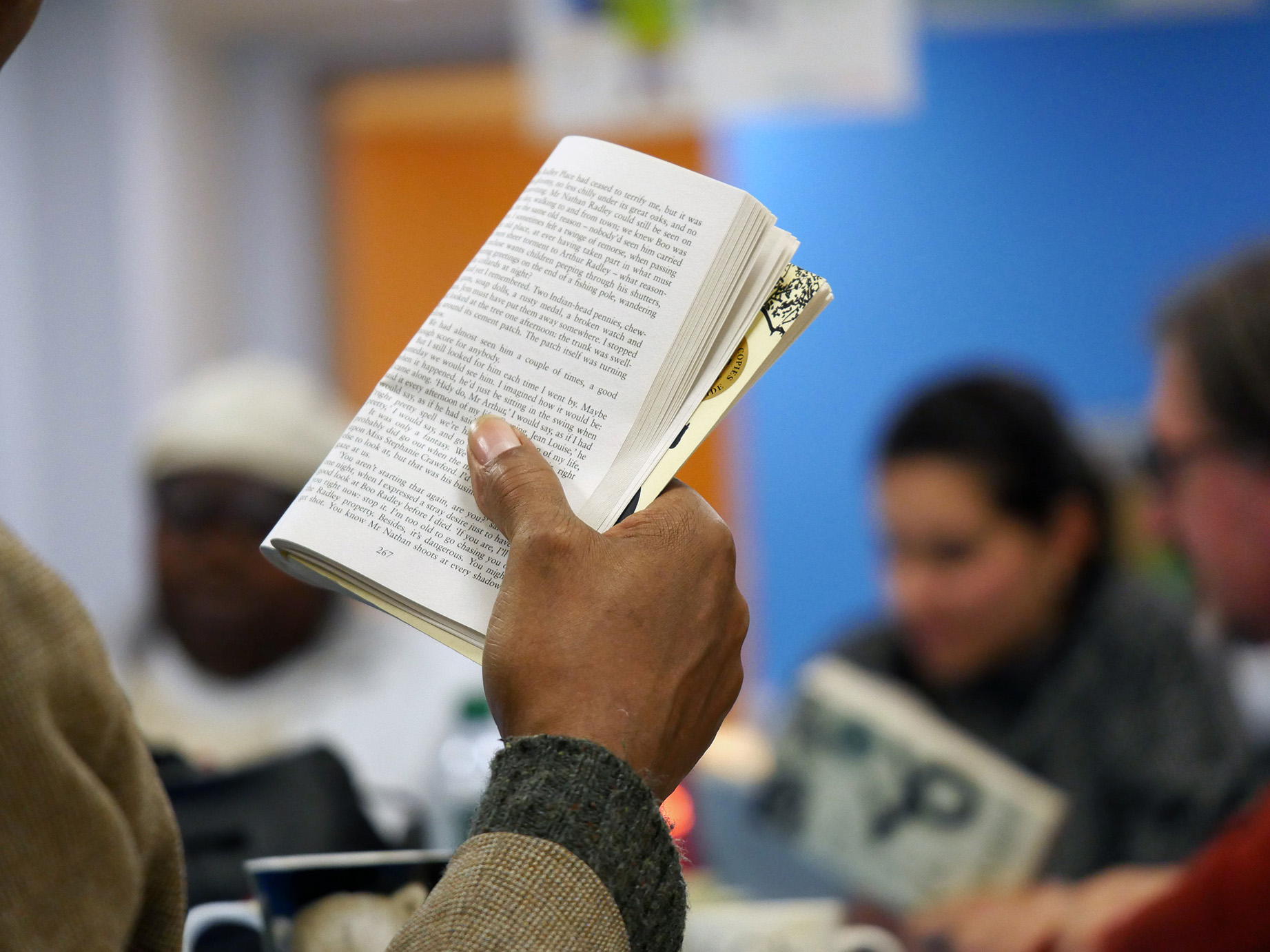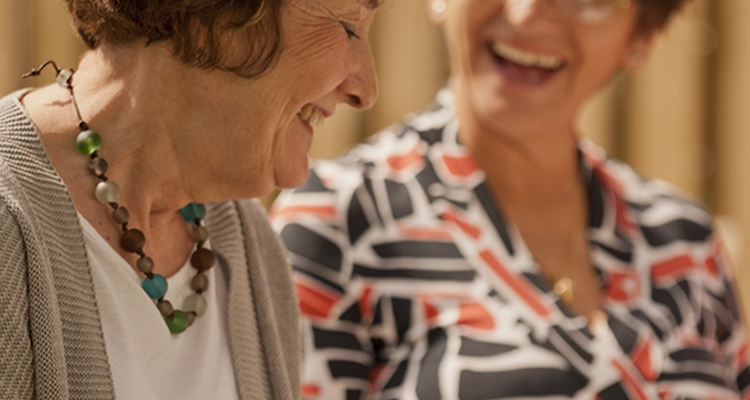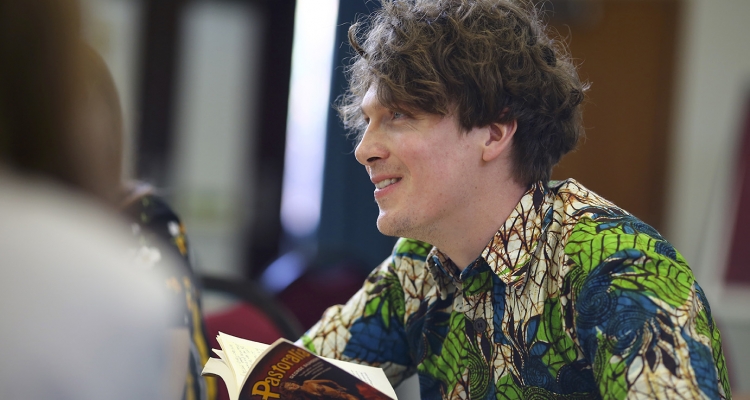We regularly evaluate the impact of our work, engaging closely with external research partners to explore the health, social and economic benefits of Shared Reading.
Our partners have carried out extensive research into the impact of Shared Reading for those living with mental health issues, dementia or chronic pain.
Current Projects
Shared Reading in the Age of Digitalization (SHARD)
The Reader is collaborating with the University of Basel and our international partner Sharing Stories Verein on this 5 year project exploring online discussions, face-to-face groups and the role of absorption in the promotion of reading and wellbeing.
The study will compare face-to-face Shared Reading groups as experienced by 18-25 year olds both in the UK, at The Reader’s home in Calderstones, Liverpool, and in Basel.

Storying Invisible Disability: Reading and Representing Autism
The Reader is collaborating with the University of Nottingham on a 1-year project funded by the Arts and Humanities Research Council. This project is creating opportunities to explore experiences of neurodivergence through the choice of literature for Shared Reading, with the aim of developing further understanding and guidance to ensure the practice is neuroinclusive for all readers.
The Reader is contributing as a partner to this major creative health project alongside other community organisations, health services and academic institutions. The project will create an easy-to-use digital platform where evidence-based local arts activities can be made accessible for children and young people, their families and relevant organisations and services.
Published reports
See below for a full list of published reports and research:
The Reader delivers Shared Reading groups in 34 criminal justice settings (2025), including prisons and approved premises in probation services. In October 2022 the Ministry of Justice and HM Prison and Probation Service published an independent evaluation of our Shared Reading work in PIPES (Psychologically Informed Planned Environments) carried out by Professor Alison Liebling and her team at the Institute of Criminology, University of Cambridge.
Shared Reading groups are offered weekly in all prison PIPEs and aim to provide opportunities for PIPE participants to engage socially, communicate more effectively, and make meaningful sense of themselves and others.
Ready and Waiting: What the voluntary sector can do for social prescribing in South Liverpool
Social prescribing is a key component of the NHS Long Term Plan. It aims to help people to have greater control over their own health and wellbeing by connecting them to social activities in their communities, such as Shared Reading, volunteering, gardening and many others, that deliver measurable health outcomes. In the Liverpool City Region, VCSEs (Voluntary, Community and Social Enterprises) play a vital role in delivering these activities.
In 2019, The Reader – working alongside partners LCVS, Capacity and PSS – led a collaborative project that brought VCSEs, local Primary Care Networks and communities in South Liverpool together to explore and test the barriers preventing patients from making the most of the VCSE social prescribing support and services already on offer in South Liverpool.
The insights and information gathered throughout the 12-month project are captured in this report which was published in autumn 2020.
Stronger Foundations for the Future: Growing Shared Reading with support from the second half fund.
In 2017, The Reader embarked on a 2-year collaborative project to bring the health and social benefits of Shared Reading to more than 2,000 people in communities across the North West. The Shared Reading North West project was supported by innovation foundation Nesta and the Department for Digital, Culture, Media and Sport Crucial through The Second Half Fund. This report reflects on our progress in evidencing the impact of community-delivered Shared Reading throughout the lifetime of the project.
Parental Engagement Interventions: A feasibility study
The Reader and its Stories for You and Yours programme was one of five organisations selected for inclusion in a project funded by the Sutton Trust and supported by the University of Oxford’s Department of Education. This generated some key learning for the organisation around the challenges and opportunities associated with research and evaluation in the Early Years. 30 primary schools were recruited to the study during 4 school terms (2015-2016), providing data across a range of outcome measures.
An Investigation into the Therapeutic Benefits of Reading in Relation to Depression and Wellbeing
This research partnership between The Centre for Research Into Reading, Literature and Society (CRILS) at The University of Liverpool, Liverpool Primary Care Trust and The Reader looked at two Shared Reading groups over a 12-month period. The participants had all been diagnosed with depression and the clinical data indicated that there were statistically significant improvements in their mental health during the period.
Includes 11 case studies alongside personal feedback from group leaders on their own key moments and findings from their reading in care homes, this provides an inspiring introduction to reading with older people, whatever their situation.
An Evaluation of a pilot study of a literature-based intervention with women in prison
This provides an insight into what women in prison can get out of shared reading, with quotes included from the perspective not only of the group members, but also the prison officers and the group leader at the time.
Cultural Value: Assessing the intrinsic value of The Reader’s Shared Reading Scheme
This short report draws out what it describes as the five intrinsic elements of the Shared Reading experience: Liveness, Creative Inarticulacy, The Emotional, The Personal, and The Group. There are also further examples included of group members responding to what they are reading, and of what it is that impacts them.
A Comparative Study of Cognitive Behavioural Therapy and Shared Reading for Chronic Pain – 2016
This report provides moving analyses of what shared reading can do for people when their lives have been dramatically altered due to illness, loss and depression. It also explores in further detail the idea that shared reading might be therapeutic without being a therapy.
This report is particularly useful for the range of settings and communities that Shared Reading is shown to be able to reach; from young children in a school to older people living with dementia, as well as groups of people recovering from addictions, or who are living with severe and enduring mental illness.
Recommended reading on Shared Reading Practice
There is a rich body of writing available in this area. We have featured below some of the key titles which continue to inform The Reader’s teaching and delivery of Shared Reading practice. We are always open to new discoveries and would welcome recommendations of any further research to add to our list.
- Reading by Philip Davis and Fiona Magee (Emerald Publishing, 2020)
- Reading for Life by Philip Davis (Oxford University Press, 2020)
- Reading and Mental Health, edited by Josie Billington, and featuring Reader staff (Palgrave Macmillan, 2019)
- Reading Literature and Chronic Pain (upcoming) by Josie Billington (Bloomsbury, 2025)
- ‘A study into Shared Reading groups, with specific relation to religious reading’ by Esther Harsh, in Frontiers in Psychology (2022)
- Shared Reading: The Ultimate Therapy by Jan Raes (Lannoo, 2021)
- Reading and The Reader (The Literary Agenda), (Oxford University Press, 2013)
- The Reader Magazine 1997-2023 with many articles by Reader staff members including Chris Lynn
- The Reading Cure’ by Blake Morrison in The Guardian (Review), 5 January 2008
Reflective accounts of individual sessions from Reader Leaders:
Working with us
We are interested in opportunities to strengthen the evidence base for Shared Reading. We are keen to update our portfolio of research, to expand our networks and partnerships in this area, and to use research to continue to demonstrate how The Reader’s practice of Shared Reading may be able to help in addressing some of the biggest challenges that we face as a society. We are particularly interested in opportunities with a focus on Shared Reading with children and young people, and people living with dementia.
If you are interested in collaborating with The Reader you can get in touch with us at research@thereader.org.uk. If you do have specific ideas for a research project we would ask that you submit some details along with your message using our proposal form [click to download]. We receive a lot of requests and may not be able to facilitate projects requiring student supervision. However all requests will be given consideration and will receive a response in line with the process described on the form.







